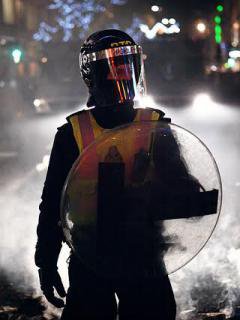Michael Bloomberg, New York City’s recently regretted mayor, once boasted that his Gotham was policed by the “seventh biggest army in the world.” His brazen almost casual identification of municipal police with a standing army was no idle metaphor: for citizens everywhere it captures an everyday reality.
It may of course be a comfort to the already comfortable to know that their city’s best face—with its pretty precincts of manicured greenery, choice views, and deferential school children—is dutifully garrisoned by its finest; trained and outfitted for the task. To those living beyond the paywall, however, far from any place a besotted tourist might wander, the very same familiar guardians prove a waking nightmare; a great confraternity of bullies, roving the streets and meting out a thousand daily torments and humiliations under the guise of official justice.

Flickr/hozinja. Some rights reserved.
Recently, a £20,000 settlement was awarded to me by the Metropolitan police, not in recognition of their selective brutality, but as a way of preventing an embarrassing court proceeding. The commissioner was forced to admit “apparent inconsistencies” between officers’ accounts claiming I violently attacked them and video evidence proving that, in fact, I was the one being attacked by officers. This was after raising a civil claim in respect of those same officers attending court to give evidence to have me convicted.
Bloomsbury is unfamiliar territory for the MPS; and when they gave me the business, and I emerged from a scrum of arresting officers, shaken and bruised, my shirt torn, cameras happened to be rolling. My hands were up, to demonstrate I was peaceable. I made no threats. I only voiced the stray observation that a kid already caught in the kettle did not require further manhandling. That he was Asian did not strike me; nor did it that three of the four people arrested that day, including myself, were minority ethnic as well, in spite of the crowd’s makeup. For today’s urban men of color—protests afoot or no—this is just another day in the life. And like myself, it can be safely assumed these other arrestees - after the obligatory strip search, swab, and photograph - were held under shifting charges, refused food, and left overnight in a detention cell as I was. The main difference with my experience is that unlike 1,433 other guests at Casa de Met, I woke up alive the next day.
Do you know what “positional” asphyxia is? It is death by forcible restraint, when the very breath is pushed out of you by the weight of an assailant. It is also the number one cause of death in police custody. Survive custody, and other indignities await. Of the 44,000 strip searches performed on children in the 21 months leading up to 2012, the Guardian reported that not a single gun or knife was discovered, and of the 275 “illicit items” which were found, tobacco was the most common item. Some of the children were as young as 12. Half of them were black or Asian.
The reason for these “excesses” is not obscure. There is simply no effective means or mechanism for policing the police. Assuming a bit of luck and an easy case, the most victims or bereaved loved ones can expect is the ersatz justice of damages, awarded in a backroom. Not structural reform – beyond those that succeed in consolidating state and police power, nor the conviction of offenders (“the last time a police officer was successfully prosecuted for the death of somebody in custody was in 1969”). Nor even apologies, lest a moral victory get a head of steam and evolve into a precedent. (Indeed, the Met who arrested me soundly rejected a deal I later proposed remitting £5,000 of my settlement for a set of apologies.) Only a spot of money, vouchsafed by their actuaries. Were my socioeconomic background patchier, and I poorer and without a connection to Oxford University, you can trust this would have taken longer and I would likely have received a pittance, or nothing - in short, had I needed it more I would have gotten less; that’s the game.
Nevertheless, let it be known that there is a price exacted for each incidence of police violence, from compensating a victim to quashing a riot. It means one less pound for overtime to brutalize a protester, one less pound to murder another unarmed black person, or to remunerate a sleazy cop to strip search another young person. And soon I may even be among the last to receive damages. Proposed cuts to legal aid - founded on the unshakeable argument that legal aid, like tanks and tax cuts and everything else in this vale of tears, costs money - will hamstring the vulnerable, and leave most victims of police boredom and animus without the means of pursuing viable legal action. Have the proprietors of the state and capital learned nothing from the long, sordid history of attempts by the powerful to limit redress? Riots and rebellions do not come from the void - they are created.
Read more
Get our weekly email
Comments
We encourage anyone to comment, please consult the oD commenting guidelines if you have any questions.